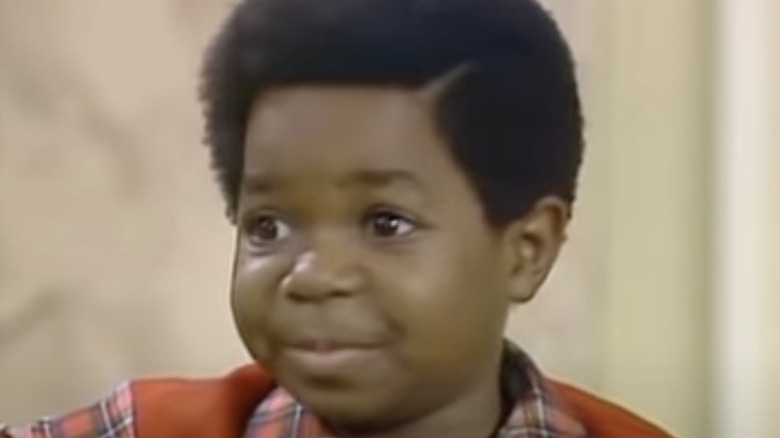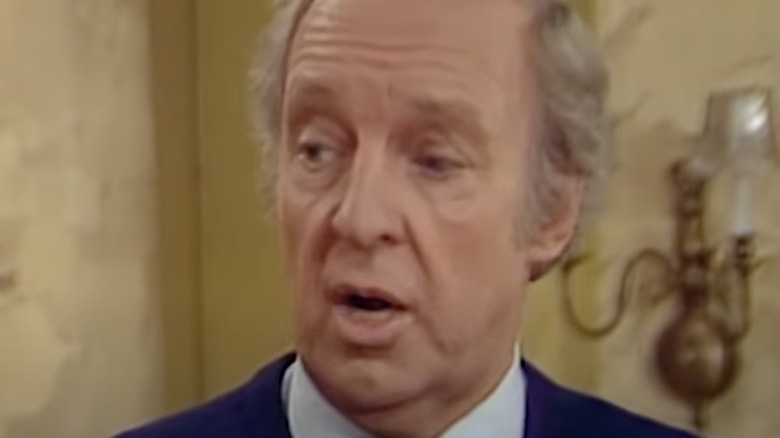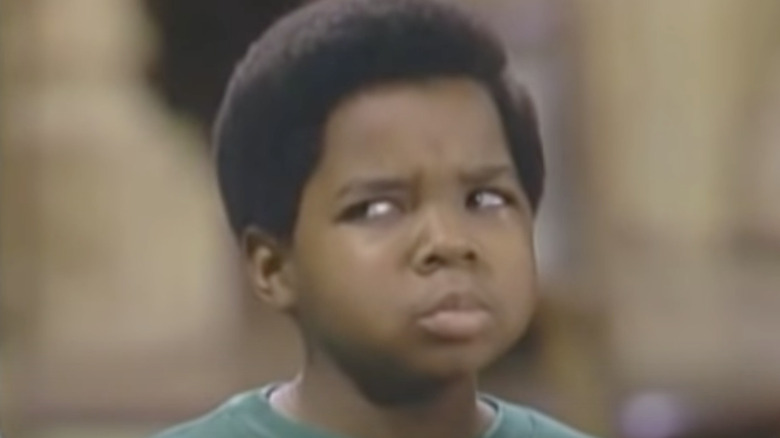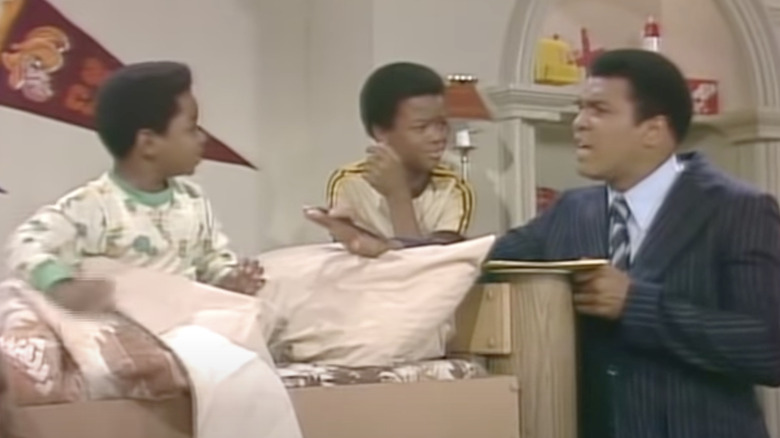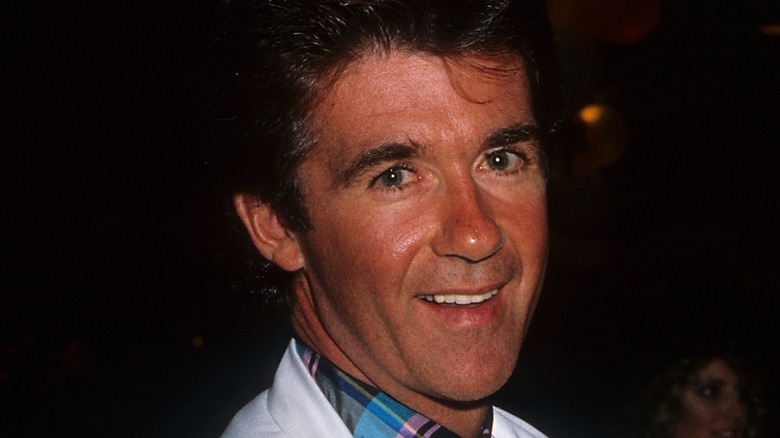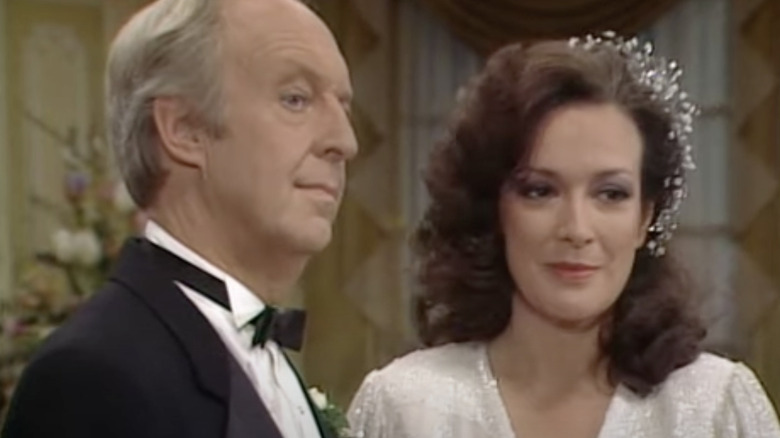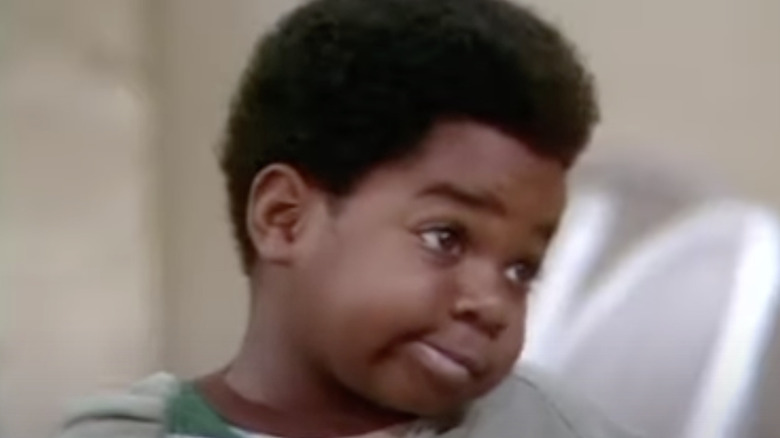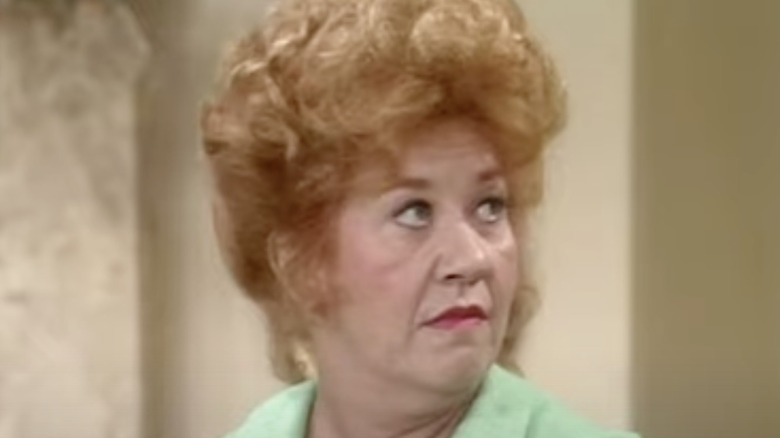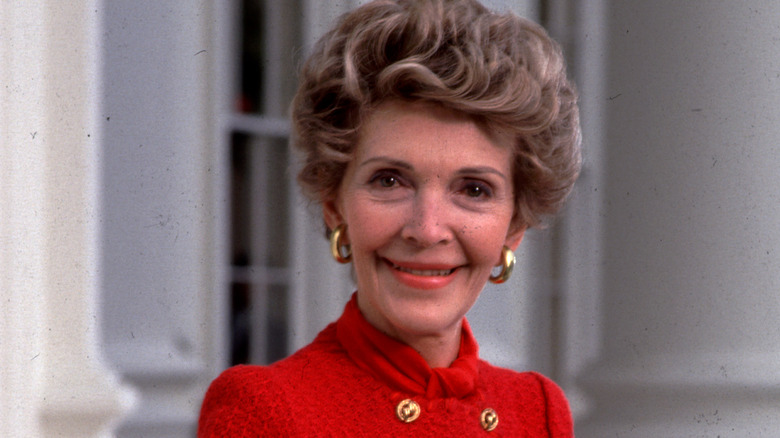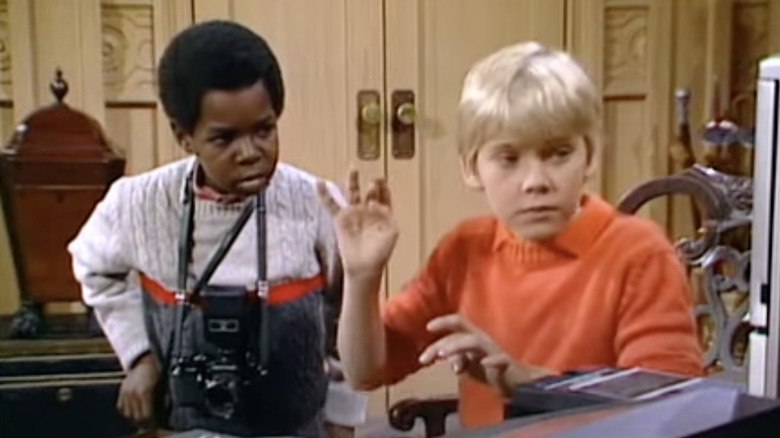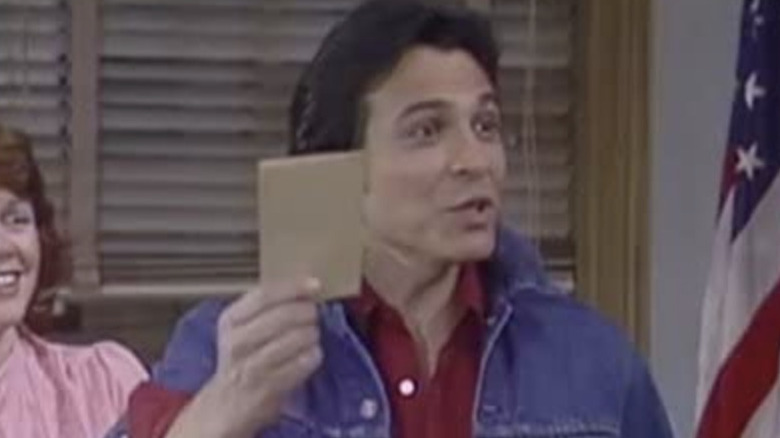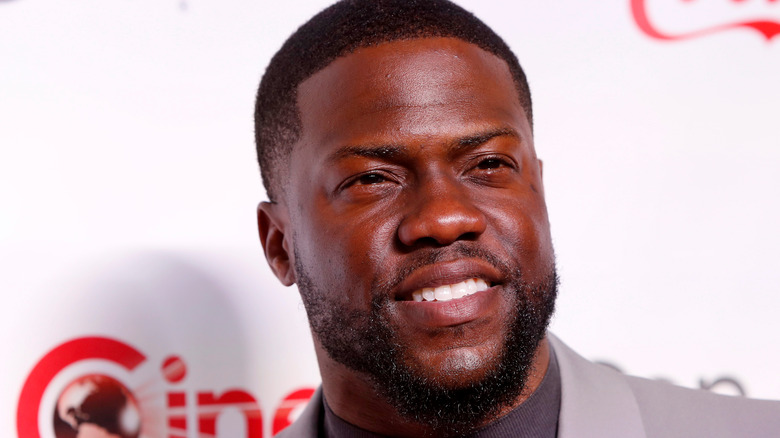The Untold Truth Of Diff'rent Strokes
A sticky-sweet network sitcom the whole family could enjoy, "Diff'rent Strokes" was a smash hit for NBC (before a late-run move to ABC) for almost a decade, airing from 1978 to 1986. "Diff'rent Strokes" was also quietly provocative, as it was a show about a nontraditional permutation of the family unit rarely seen on TV at the time. The premise: After his African-American housekeeper dies, wealthy white businessman Philip Drummond (Conrad Bain) takes in her two boys, Arnold and Willis Jackson (Todd Bridges), and raises them as his own in a fancy Manhattan apartment, expanding the family that consists of just him and his teenage daughter, Kimberly (Dana Plato).
While family issues, race relations, and economic disparity were part of the DNA of "Diff'rent Strokes," what made it popular was that it was a fun and funny sitcom, thanks in large part to wildly charismatic, preternaturally-talented child actor Gary Coleman. As Arnold, Coleman won the hearts of millions with his mugging and infectious "Whatchu talkin' 'bout, Willis?" catchphrase.
Now, here's a "very special episode" of untold truth, focusing on "Diff'rent Strokes," which once ruled the world.
Diff'rent Strokes was born out of The Little Rascals and Maude
"Diff'rent Strokes" wasn't always "Diff'rent Strokes." Co-created by seasoned sitcom and variety TV writers Jeff Harris and Bernie Kukoff, the series was originally pitched under the name "45 Minutes From Harlem," reflecting the physical and metaphorical distance for the central character, an African-American child adopted by the wealthy, white employer of his deceased housekeeper mother. When it fell under the purview of Tandem Productions, headed by TV uber-producer Norman Lear ("All in the Family," "The Jeffersons"), the show was developed and smoothed out into "Diff'rent Strokes," also populating the show with an older brother (Willis Jackson) for the main child (Arnold Jackson) and a biological daughter (Kimberly) for the adoptive father (Philip Drummond).
The series served as a vehicle and landing place for two performers in need of work. Lear discovered child actor Gary Coleman when he saw him in a McDonald's commercial (according to "Behind the Camera: The Unauthorized Story of 'Diff'rent Strokes'") and cast him in a proposed made-for-TV reboot of "The Little Rascals." The revival of the old movie shorts didn't get picked up to series, so Lear cast Coleman in "Diff'rent Strokes" as Arnold Jackson. For the role of kindly Mr. Drummond, he inserted Conrad Bain, who had a deal to star in another show as soon as possible following the end of his previous series, "Maude," a Lear production.
Talkin' 'bout "Whatchu 'talkin' 'bout"
By far, the most popular and enduring element "Diff'rent Strokes" unleashed into the popular culture was the catchphrase uttered countless times by star Gary Coleman as sassy kid Arnold Jackson. When presented with confusing or unfortunate information from his older brother, Arnold would frown and loudly and speedily quip, "Whatchu talkin' 'bout, Willis?" The audience would react with delight and uproarious applause, and the line entered the pantheon of all-time great catchphrases. It all came from a spur of the moment decision — a fated, experimental line read based on actorly instinct.
"It was written, 'What are you talking about, Willis?'" show writer Benn Starr told the Television Academy Foundation. "And the kid said, 'Whatchu talkin' 'bout,'" he added, referring to Coleman, only 10-years-old at the time. "That was it. We used that a number of times on every show," Starr explained, adding that he and other "Diff'rent Strokes" writers "didn't want to overdo it," so some weeks, they'd write the catchphrase into the script "just once."
A Diff'rent Strokes guest star inadvertently gave the show its name
The title of the sitcom "Diff'rent Strokes," with a little creative spelling and punctuation to speed up the pronunciation of the first word in a casual, colloquial fashion, is an abbreviation of and reference to the common phrase "different strokes for different folks." It's a sentence fragment of an aphorism that means, essentially, "to each his own" or "whatever floats your boat," and in its usage here, as the name of a show about a single, white man who adopts two Black children, that families comes in a variety of forms.
"Different strokes for different folks" is a well-known saying, but it's not an old expression — it dates back to slightly more than a decade before the debut of "Diff'rent Strokes." According to The Yale Book of Quotations, quotable, rhyme-prone boxer Muhammad Ali dropped the line in an interview with a Kansas newspaper the Great Bend Daily Tribune in 1966. Things came full circle in October 1979 when Ali appeared as a special guest star, playing himself, on "Diff'rent Strokes," the show he indirectly named.
A star of another sitcom wrote and sang the "Diff'rent Strokes" theme song
One of the most vital, memorable elements of "Diff'rent Strokes" is its jaunty, hard-charging theme song. It was co-written and performed by Alan Thicke, years before he would star on his own hit family sitcom, "Growing Pains." In the 1960s and 1970s, Thicke wrote for several TV variety shows both in the United States and in his native Canada, including "Fernwood 2Night" (later rebranded as "America 2-Night") creator producer Norman Lear's goofy late night talk show. Lear went on to produce "Diff'rent Strokes," and for the theme song, he selected a tune co-written by "Fernwood 2Night" staffer Thicke.
By the time the comedy went into production in 1978, Thicke had established a healthy sideline as a theme song composer — he also wrote the music for the game shows "Stumpers," "Celebrity Sweepstakes," "The Joker's Wild," and "The Wizard of Odds." The latter is one of the few he also performed himself, along with the "Diff'rent Strokes" opening tune, which Thicke sang with his then-wife, Gloria Loring. decades later, his son Robin Thicke would join the family business, becoming a chart-topping singer/songwriter.
Diff'rent Strokes brought in a wife for Mr. Drummond, and then replaced the actor who played her
During Season 6 of "Diff'rent Strokes," writers decided to switch up the premise and revitalize the aging series by giving doting dad Philip Drummond a permanent love interest. In the January 1984 episode "Drummond's Lady," the character meets TV fitness host Maggie McKinney to discuss investing in her business, but soon realizes he's got romantic feelings for her. By the end of the season, Mr. Drummond and Maggie have married, and Dixie Carter (later known for her starring role on "Designing Women") had joined the regular cast of "Diff'rent Strokes."
It wouldn't last, however — not the relationship, but Carter's tenure on the series. In August 1985, according to UPI, Carter officially left the show in advance of its eighth (and ultimately final) season. "There will just be a new Maggie," star Conrad Bain said, referring to how producers opted to recast the character of Maggie, bringing in actor Mary Ann Mobley. The sudden, drastic change in Maggie's appearance was not acknowledged on the show, nor was the confusing fact that Mobley had already appeared on "Diff'rent Strokes." In a Season 2 episode back in 1980, she portrayed Miss Osbourne, Arnold's teacher who went out on a date with Mr. Drummond.
Gary Coleman demanded a salary increase
When "Diff'rent Strokes" started its run in 1978, scene-stealing child actor Gary Coleman was relatively unknown, having appeared only a handful of times on some mid-'70s TV series. According to the New York Times, his initial salary on "Diff'rent Strokes" was commensurate with his experience — he earned $1,800 per episode. After the show debuted and started to take off in the ratings, thanks in large part to Coleman, the actor's representatives renegotiated and got that per-episode fee up to $30,000. By Season 3 of "Diff'rent Strokes," the comedy was a top 20 hit, and with more seasons on the way — and reruns poised to enter the lucrative five-days-a-week syndication market — Coleman's people once again wanted more money. "His agents recognized what they had, and got a lot of money," "Diff'rent Strokes" writer Ben Starr told the Television Academy Foundation.
Coleman's team took the actor's employer, Tandem Productions, to court, and the company countersued for millions it may have encountered in losses should Coleman's persistence end or damage the popularity of "Diff'rent Strokes." The sides eventually reached an agreement, and the fourth season of the series started a little late in the fall of 1981. According to Jet, Coleman wound up with a per episode salary of $70,000, making him NBC's highest paid sitcom star at the age of 13.
Why Mrs. Garrett and Kimberly Drummond left the series
The pilot episode of "Diff'rent Strokes" featured a small, core cast of five actors: Conrad Bain as rich dad Philip Drummond), Gary Coleman and Todd Bridges as his adopted sons Arnold and Willis Jackson, Charlotte Rae as housekeeper Edna Garrett, and Dana Plato as Kimberly Drummond, Philip's biological daughter. Not long after, and well before the end of the series, both Rae and Plato would be written off of "Diff'rent Strokes."
Kimberly didn't live with the Drummonds full-time in Manhattan; she was a student at an upstate New York boarding school, serving as a link for the spinoff "The Facts of Life," in which Rae took her "Diff'rent Strokes" character to the academy to serve on the staff. Rae thus disappeared from the original show midway through its second season (returning for one cameo appearance in 1984) and stayed with "The Facts of Life" until 1986.
According to USA Today, Plato was dismissed from "Diff'rent Strokes" because of her salacious personal life, which ran counter to the show's wholesome image and her portrayal of a squeaky-clean teen. While co-starring on "Diff'rent Strokes," Plato reportedly began drinking and tried marijuana and cocaine, and endured a drug overdose in the late 1970s. In 1983, 19-year-old Plato announced her pregnancy, and in the following year, she was let go from "Diff'rent Strokes," returning only for a handful of guest spots in the show's final two seasons.
Diff'rent Strokes just said yes to Nancy Reagan
First Lady Nancy Reagan launched the "Just Say No" campaign in 1986 (per History), formalizing the anti-drug abuse platform she'd worked on since early in the presidential administration of her husband, Ronald Reagan. According to the Washington Post, producers of "Diff'rent Strokes," which frequently aired "very special episodes" about social issues, had a story about juvenile drug abuse in the works and sent a letter to the First Lady asking her to tape a short public service announcement urging kids to stay away from drugs, which they could tag onto the episode. Reagan's staff had another idea — to make a scripted cameo.
"We thought her presence at the studio all day would make her role more meaningful," Reagan's press secretary Sheila Tate said. "Before accepting, we had to assure ourselves that it was a serious effort to educate children." Also affecting Reagan's decision to appear on the show: At the time, "Diff'rent Strokes" was the most watched show among the demographic she most hoped to reach: kids aged 6 to 11.
The plot of the March 1983 episode "The Reporter": Arnold (Gary Coleman) publishes a shocking story about rampant drug use among his elementary school peers. Nancy Reagan reads it, then stops by the house to congratulate Arnold on fighting the good fight. This "Diff'rent Strokes" installment marked only the second time that a sitting First Lady appeared on a TV show, following a phone call from Betty Ford on a 1975 episode of "The Mary Tyler Moore Show."
Many TV shows are connected to Diff'rent Strokes
"Diff'rent Strokes" aired for a robust eight seasons and produced one spinoff that ran even longer, "The Facts of Life." Yet, due to the nature of NBC's promotional aims, "Diff'rent Strokes" sits at the center of an elaborate, accidental TV universe, linking together many popular TV shows that otherwise have little to do with one another. After leaving the very popular "M*A*S*H," actor McLean Stevenson went on to star in the short-lived 1979-1980 sitcom "Hello, Larry." Stevenson's character was a radio personality on a Portland station owned by Philip Drummond (Conrad Bain), an old army pal (and the leading adult on "Diff'rent Strokes"), and Larry made a crossover appearance in a Season 1 episode.
"Diff'rent Strokes" wasn't the only early '80s NBC sitcom about a little boy thrust into a world of wealth and luxury — the network also broadcast "Silver Spoons," starring Ricky Schroeder as Ricky Stratton, a kid who meets and moves in with his immature, toy company heir father. On the 1982 "Silver Spoons" episode "The Great Computer Caper," privileged Ricky met the also-wealthy Arnold Jackson (Gary Coleman). And in 1996, a decade after a move to ABC and then cancellation for "Diff'rent Strokes," Bain and Coleman reprised their roles as Philip and Arnold Drummond, respectively, in a brief appearance on the series finale of NBC's "The Fresh Prince of Bel-Air," as prospective buyers of the Banks' family's mansion.
The Diff'rent Strokes spinoff that never was
"Backdoor pilot" is a TV industry term for when a show airs an episode in which few of its regular characters appear, with the action focusing on brand new people and situations, all with the intent of setting up a brand new show which would technically be a spinoff of the mother series. "Diff'rent Strokes" already launched one successful spinoff in 1979, "The Facts of Life," when housekeeper Mrs. Garrett took a job at a private school, and in 1981, producers tried it again with the Season 3 episode "Almost American," a backdoor pilot for a new sitcom called "Night School."
According to Richard Irvin's "Spinning Laughter," the proposed series was written by three "Diff'rent Strokes" staff writers and concerned Catherine Armstrong (portrayed by Maureen McNamara), an inexperienced teacher who takes a job helping a group of first-generation immigrants from around the world prepare for their American citizenship test. Despite the vote of confidence from "Diff'rent Strokes," in the form of bumpers featuring that show's regular cast, NBC passed on the "Night School" concept.
Diff'rent Strokes' return to TV in 2021
Decades after it went off the air, "Diff'rent Strokes" was able to further its position among the pantheon of treasured TV favorites from decades past as it was scheduled to be revisited for network television with a whole new cast — albeit, as a one-night only live event presentation.
On December 7, 2021, ABC's third installment of its occasional "Live in Front of a Studio Audience" specials, produced by late-night host Jimmy Kimmel and prolific TV producer Norman Lear, is scheduled to focus on the classic series. The latter's Tandem Productions brought "Diff'rent Strokes" to TV in the 1970s, so it was a candidate for a revival via the show's format of high-profile actors re-creating an old episode, then broadcast live.
This new take on "Diff'rent Strokes" stars John Lithgow as Philip Drummond, Ann Dowd as Mrs. Garrett, and two adult comedians playing the child Jackson brothers: Kevin Hart and Damon Wayans as Arnold and Willis, respectively. Appropriately enough, the special presentation has been paired with another old episode made new — an installment of "The Facts of Life" starring Jennifer Aniston and Kathryn Hahn.
